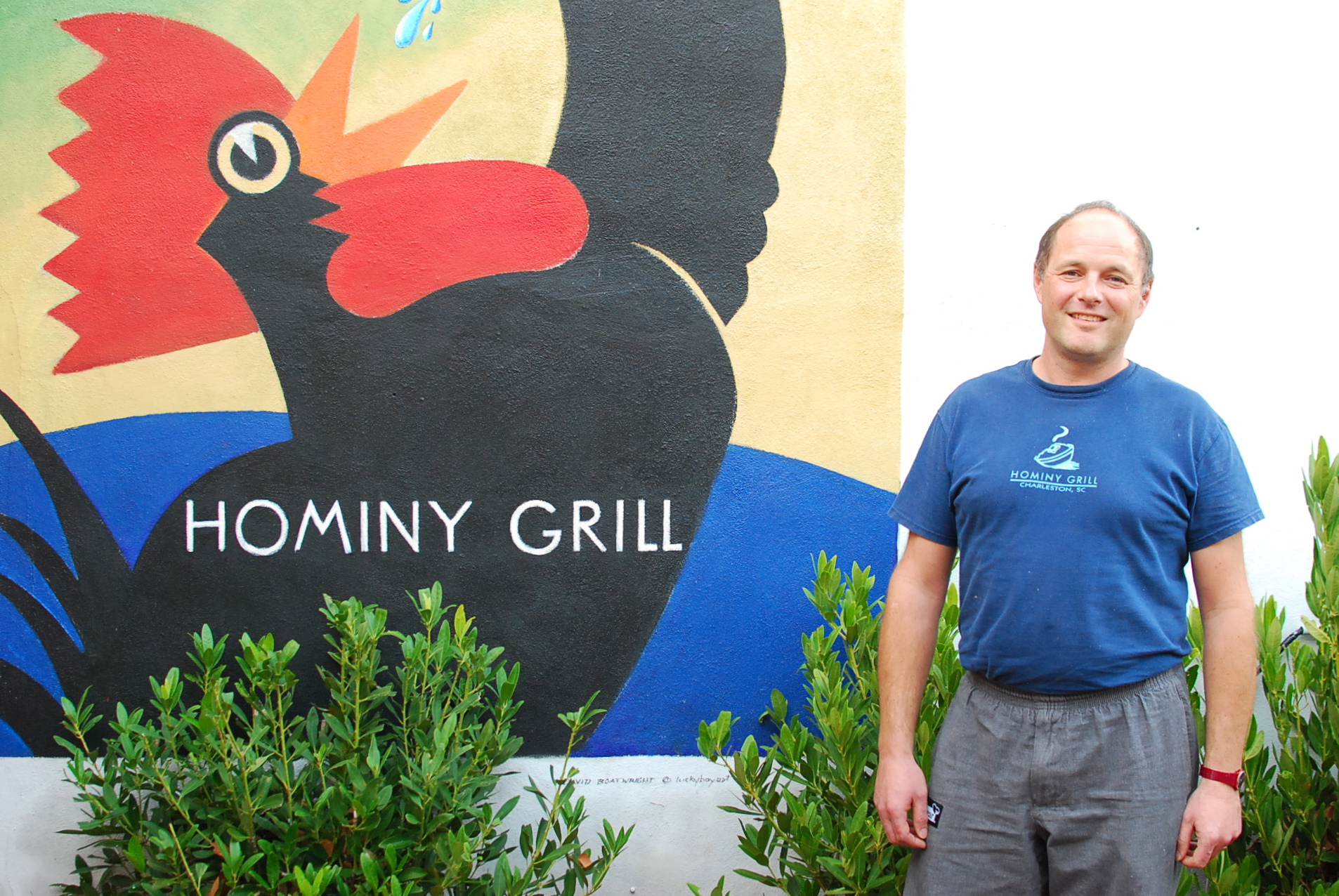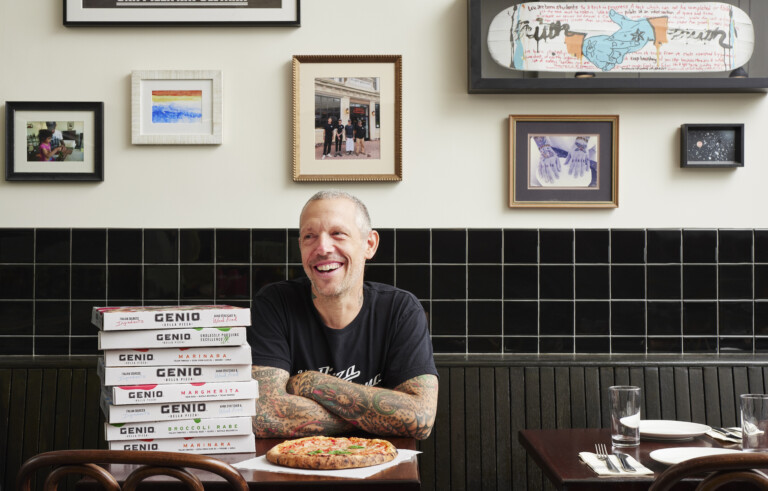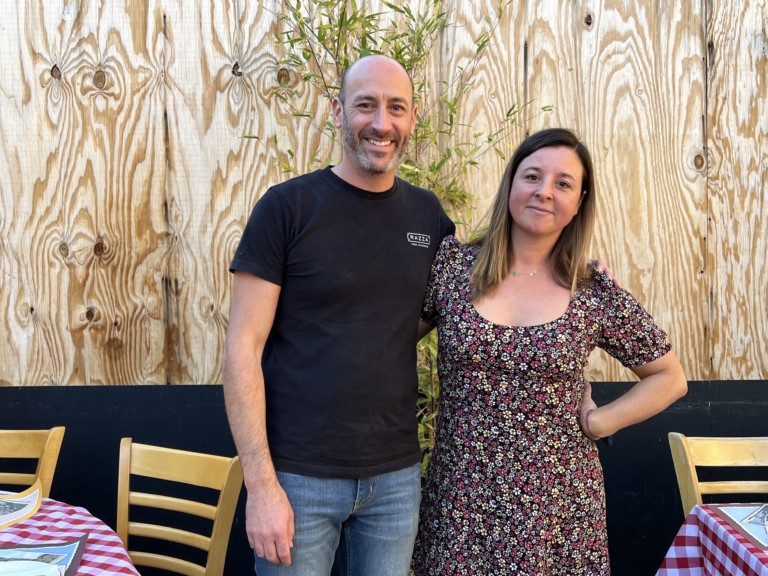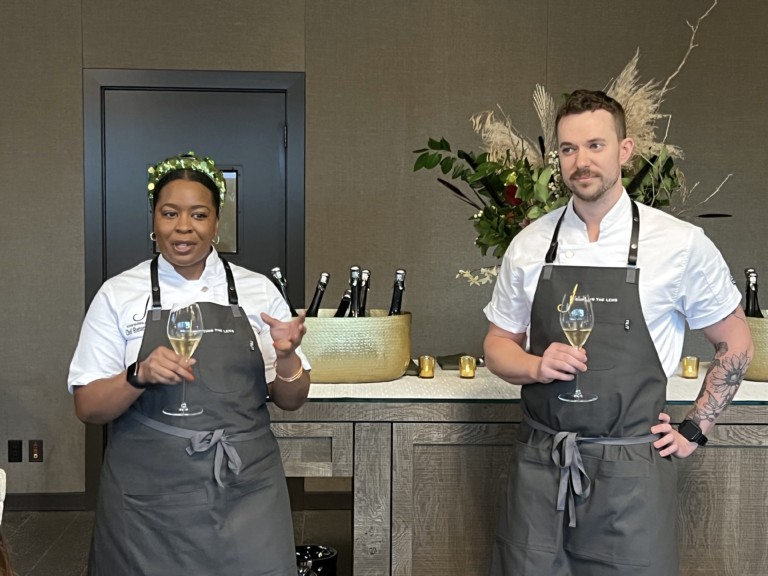North Carolina native Robert Stehling started cooking professionally in college, at Chapel Hill’s legendary Crook’s Corner, before heading north to New York. He worked in comfort food emporiums like Home and Sarabeth’s Kitchen, plus cutting edge restaurants like Arizona 206. In the mid ’90s, he relocated to Charleston to open Hominy Grill, which has become a modern Lowcountry institution. We met at the restaurant on December 27, and Stehling shared several culinary insights.
Was it a given that you would become a chef for a living, or did you consider other careers along the way?
I considered other careers. I tried for awhile. I started washing dishes when I was a freshman in college. I was an Art major, so that wasn’t really going anywhere, and I got excited by cooking, and kind of put off my art career, or my art education. But there was about five years there where I was thinking, “Well, maybe I’ll go back to school and I’ll become an X, Y, Z.” Finally after about five years of cooking, I thought this is what I’m doing, and I was enjoying it, and this is it. I never looked back.
So your brother John has a restaurant in Asheville?
Yep, yep, Early Girl. Early Girl Eatery.
Would your parents be more surprised that you or your brother ended up opening a restaurant?
I don’t think they were surprised by either one. I think they saw where it was going pretty early on. They were proud we were able to keep jobs.
Did you cook with your brother growing up?
Not a whole lot. We all played a little bit in the kitchen, but I started cooking professionally, and my brother decided that he would go to college and get into restaurant management school at East Carolina University. We would plan to be here in business together, and I ended up down here and I got him to come down for a couple years. It didn’t really work out because we’re both back of the house people. So he took my best front of the house person and moved to Asheville because he wanted to be in the mountains, and I wanted to be by the beach. It was an amicable split. We just decided that it wasn’t going to work out that way.
Do you get together for the holidays?
Yeah. Yeah. We were together for Christmas.
What did you have at the house to eat?
That was tricky. It was kind of everything. Disgusting. [laughs] My parents cooked, my parents and sister. And my sister came from New Orleans. She brought jambalaya and gumbo, and a ham. There was pork belly, and there was a turkey, and there was a beef brisket. It was all too much. I felt overwhelmed and kind of started to shut down. With all this eating going on, it was crazy.
Does your sister work in the restaurant industry too?
No, she doesn’t. She is a safety manager for a steel recycling plant right on the Mississippi River. My dad does work in a restaurant though. He’s the pastry chef for my brother’s restaurant. He retired. He had a long career that went nowhere and ended up working in Old Salem, in Winston-Salem, in a bakery there, the Winkler Bakery, which is in a restored Moravian community, a German religious sect, which is like the Quakers, who moved down from Pennsylvania. They were given a land grant in the middle of North Carolina when that was frontier, and they set up the town. He would go in there, and there was a great big vaulted ceiling oven, he’d go in at 5, build a roaring fire in there, heat it up and scrape all the coals out and bake everything in there, starting with the bread and working down to the little Moravian wafer cookies. When my mom retired, they moved to Asheville and started working for my brother. It’s the best job he’s ever had.
What’s the first dish that you ever remember cooking growing up?
It was probably spaghetti, something like that. We used to make box cake mixes and get over the top on the cream filling and the icing and stuff. That’s what we played around and did. A birthday was a good excuse to bake a cake. I learned to do eggs pretty early on, and grilled cheeses, and spaghetti with meatballs. I was fascinated by meatballs. I remember making Swedish meatballs with fondue to dip into, since this was in the ’70s. I have no idea of the recipe, but that was a pretty exotic thing to me to make.
None of those dishes really fit into the Hominy Grill paradigm, really?
No, not really. That took a little while to come around.
What was the very first night like in a professional restaurant kitchen, and where was that at?
I started at Crook’s Corner in Chapel Hill. I was the dishwasher, and I remember getting the job. It was the summer after my freshman year in college. I didn’t want to go home, so I went in and Bill Neal was the chef there. I walked in the kitchen and said, “I heard you were hiring dishwashers.” One of my friends – we were on our way to go swimming – he said they were hiring. I needed a job, so we stopped by, we went in, and he put me on the schedule. He told me as I was leaving, he said, “Wear some shoes,” cause we were all in swim trunks and half naked. I don’t remember washing dishes. I remembered how miffed I was when they put a shelf above my station. Before I had just kind of a blank wall, and you’d stare at it all night long and they’d show a movie in the back of your brain, on the wall, and the night would pass. You’d always be excited when something good came into the bus tub, hushpuppies that were still warm, the bus tub gourmet. I started slowly to do more and more prep, and started to learn to cook.
I remember the first day where things went really, really bad in the day. I was slamming pots and pans into the sink. I think there was no dishwasher. We were just so busy, and I couldn’t get anything back, and I was getting so angry. I was having a temper tantrum in there, and Bill Neal came up behind me, grabbed me the arm, squeezed it really hard, and said, “Don’t you piss me off!” I threw things in the sink, stormed out and went walking around the block a couple times. I calmed down, came back and finished the shift.
Would you consider Bill Neal a mentor of yours?
Oh yeah, definitely. He set me on the path that I am today. That’s where Hominy really started, definitely.
Would you say you’ve had any other mentors over the years?
Yeah, I’d say every chef I’ve ever worked for, for the most part, was a mentor in one fashion or another. I worked at Arizona 206 with Brendan Walsh, and he was like a super chef of the ’80s, and had this big spread in Food & Wine where he rolled his Harley into the dining room and they had a picture of him holding tamales or something, sitting by the motorcycle. We just thought that was the coolest thing ever. But it was good, because there were four restaurants that were all connected, and it was my first job in New York. They brought in purveyors from Fulton Fish Market and purveyors from D’Artagnan, and every two weeks, we’d shut everything down for the afternoon and have a class. They’d have 40 line cooks from all these restaurants in there, and they’d teach us how to do food cost and stuff. I thought the rest of my life would be like this. Brendan quit after six months. He was over it. Somebody else came in and the whole thing dissolved.
What’s he up to these days?
He has had a tavern restaurant in Ridgefield, Connecticut, I believe, for a good 20 years now.
Chef Steven Picker from Sarabeth’s Kitchen. Sarabeth was a great mentor, but in a psychological way, in that she was just so intensely devoted to what she was doing. She would pick up on something like bread making or pasta, and she would strip it down to salt and water and flour, and capture wild yeast, and get her dough. “Hold my dough, cradle it like a baby, feel it form. It’s living.” All this enthusiasm for what she was doing. Steven was her executive chef, and he was the one – we’d have a meeting every two months – and we’d go through the same stuff again and again and again, about how I needed to be doing his job, and how when he walked in, all the kitchen staff straightened up, and made sure their area was clean. He wanted me to have the same effect when I walked in. I finally got it, but it was two or three years, after I wasn’t working there. I saw him and said, “Oh, Steven, I think I finally understand what you were trying to tell me all these years.” He was great.
Home restaurant, David Page and Barbara Shinn, probably had as much to do with Hominy coming out the way it did as Bill Neal did, I think. Definitely the neighborhood feel, and real dedication to American food, and identity through food. They were from Wisconsin and Ohio, respectively, and were into Midwestern food, but they were in the West Village, off Bleecker Street, so they had Murray’s Cheese, and the spice shop, and bread. They were very much combining what was in the neighborhood with their Midwestern aesthetic. It was a very personal place.
Do you miss anything about being in New York?
No, not really. We just went to Williamsburg before Christmas, which we moved from 15-16 years ago, when nothing was happening. Now there’s all this fried chicken and pecan pie. Oh man, I missed that boat, but I have this down here, so it’s worked out really well.
Are there any dishes you can’t imagine taking off the menu here?
Just about everything. The basic menu is pretty set, and the dishes are very classic Lowcountry dishes. I think people really come here looking for that, to experience that. There’s surprisingly little of that in Charleston. I don’t think the dishes themselves will change. They’ll occasionally get better. We’ll find a different product to use, or decide a different way to do things that make even more sense, or just make a better product. In that way, it’s never static. I’m continually surprised. One day I’m looking in the walk-in at the same 18 vegetables that I look at every day, for the last 15 years, and something will shake loose, and it will be a new idea, and I’ll be like, “Wow.” It’s exciting to learn something new at this point.
Do you see signature dishes as a positive?









Leave a Comment